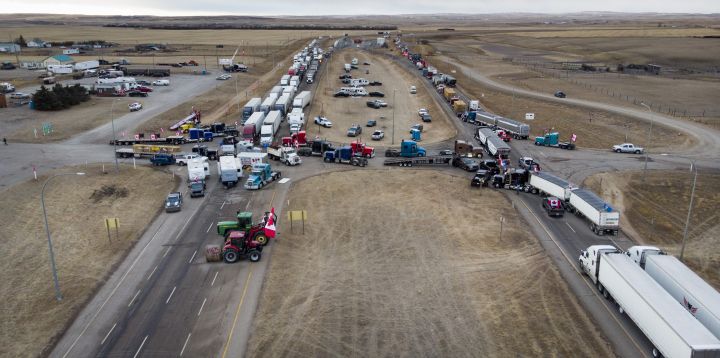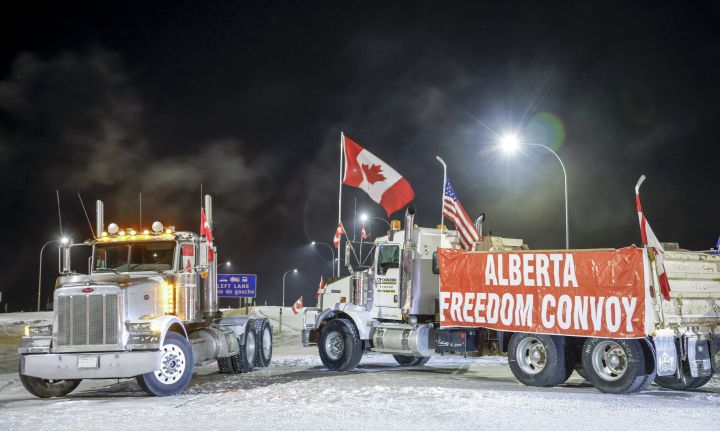The sound of blaring horns that echoed through Coutts, Alta., 10 months ago has been replaced by the steady hum of semi-trailer trucks filing through the border crossing between Alberta and the United States.

There is an undercurrent in the community of 250 people, belied by a smiley face on its water tower, that suggests an ongoing division dating back to three weeks in late January, when a convoy of truckers and their supporters shut the border in protest of COVID-19 restrictions.
There was hope that time and community events over the year would provide healing.
Keith Dangerfield, who operates the Hills of Home Café/Bed and Breakfast with his wife, was an avid supporter of the convoy. His restaurant became a regular gathering spot.
“It’s gotten worse. They don’t come to our restaurant,” said Dangerfield, gesturing at the mostly empty café behind him.
“There is a real hard line. I think the people who were in the middle of the road and had no decision, they’ve come down on the other side. It’s one side or the other.”
Betty Ostby has lived in Coutts her entire life and knows almost everyone there.
“It’s not like that in the city,” Ostby said.
“It’s always been a friendly community. The biggest fight we had was with the government over losing our school.”
Dangerfield said he doesn’t have any solutions on how to mend the rift, but hopes with more time things will improve.
“Because people can’t hate for that long,” he said.

Mayor Jim Willett’s home looks out on where the highway was blocked. He said things are far from normal.
“There’s that undercurrent of ‘you’re on that side and I’m on this side’ still. And the people who had their opinions about vaccinations and whether it’s right or wrong… they’re still there and they still have the same views,” he said.

Get daily National news
“Where I used to be able to walk down the street and wave to everybody and they’d wave back, now I don’t get all the waves I used to get. I’m not going to go out of my way to corner them somewhere and say, ‘What the hell’s going on here?”
Willett, who has referred to some of the protesters as “domestic terrorists,” joked he will be taking a month’s vacation and leaving the country if there’s a Convoy 2.0.
READ MORE: Coutts mayor says RCMP was caught off guard by blockade despite warnings
He said Coutts is a nice, small community with friendships and family relations that go back forever.
“We’re doing what we can to make it better. If we could put a sign at the entrance (saying) ‘check your politics here,’ like they used to do with the guns at the old saloons, it would be a great place,” Willett chuckled.
“Just forget about that stuff and let’s get down to living our lives and enjoy what God has given us here.”
A trial before a judge and jury has been scheduled for next year for four men charged with conspiracy to commit murder at the blockade.
READ MORE: Coutts blockaders collected firearms to use against police, RCMP documents allege
Chris Carbert, Chris Lysak, Anthony Olienick and Jerry Morin were charged in February after RCMP found a cache of guns, body armour and ammunition in trailers. Police have alleged a group at the protest was willing to use force against officers if the blockade was disrupted and described the threat as “very serious.”
Marco Van Huigenbos — a town councillor in Fort Macleod, about 150 kilometres northwest of Coutts — was an organizer of the convoy and has been charged with mischief over $5,000.
READ MORE: 3 men charged in Coutts blockade frustrated over trial delays
In an interview with The Canadian Press, Van Huigenbos said he has zero regrets.
“There is no reward for standing up, but we have to stand up for ourselves, for our kids,” he said.
“It woke up the province, the country… it gave people hope. Giving people hope is always worth it.”
Van Huigenbos said he understands the protest may not have been supported by everyone in Coutts.
The director of the Prentice Institute for Global Population and Economy at the University of Lethbridge said memories are long in rural communities and it doesn’t take much to expose the fragility of some relationships.
“Splits can happen within a community and you do see increasingly it’s ‘for or against, with us or against us.’ It’s very tough to recover from those kind of splits,” said Lars Hallstrom, a political scientist with an expertise in rural issues.
Hallstrom said a solution would be for residents to accept each other’s differences, but that can be difficult as people become firmly entrenched in their views.
“People tend to gravitate to and spend time with people they agree with and they continue to hear things they agree with and social media has this amplifying effect,” said Hallstrom.
“There’s a lot of tension even within families and we ‘just don’t talk about it’ doesn’t always fly anymore.”
- Real Canadian Superstore fined for ‘misleading’ Product of Canada displays
- ‘No reason to continue discussing’: Ontario mayor wants Andrew’s name dropped
- Danielle Smith promises Alberta referendum over immigration, Constitution changes
- Read the transcript of Trump’s response to U.S. Supreme Court tariff ruling









Comments
Want to discuss? Please read our Commenting Policy first.